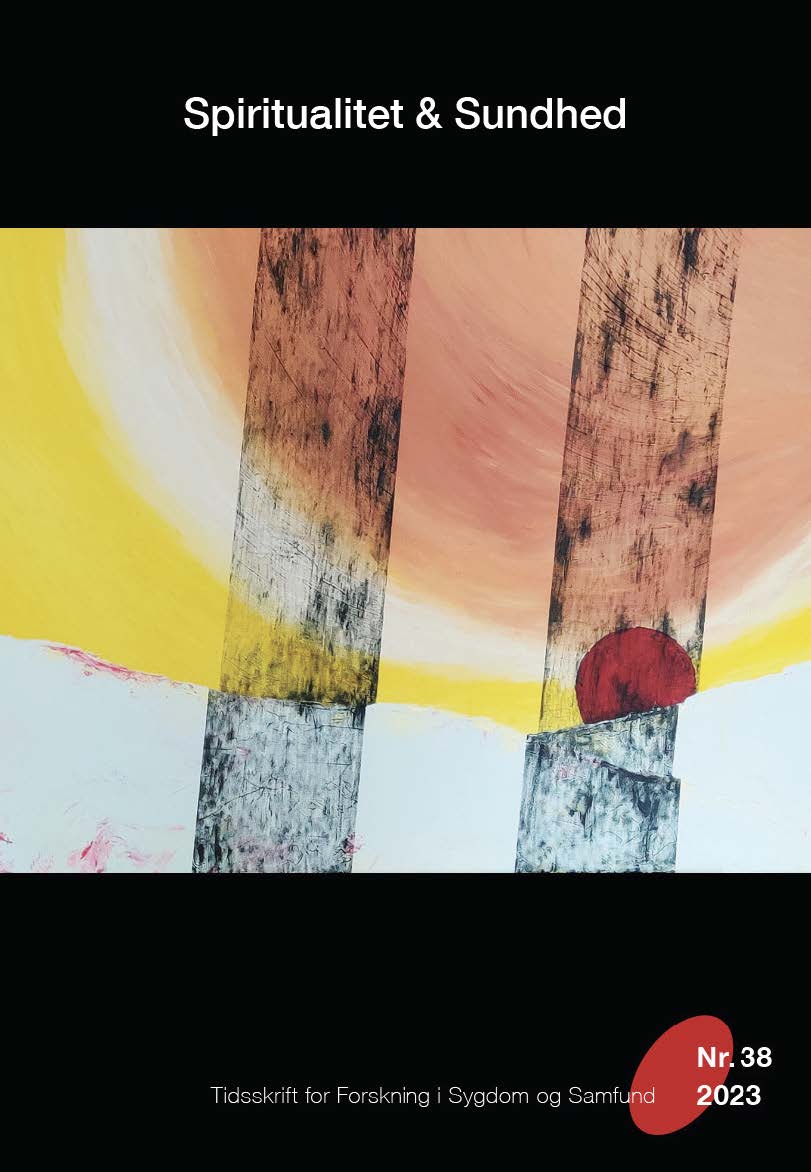Publiceret 2023-06-20
Nøgleord
- Spiritual care,
- Improvisation,
- Tacit knowledge,
- Intuition,
- Spirituality
Citation/Eksport
Resumé
The article defends the position that providing spiritual care first and foremost is an art in which tools and instruments are subordinate to practical knowledge, experience, and wisdom of the phenomenon.
A growing number of instruments and tools for spiritual care have been developed, tested, and validated. Some have been designed for the purpose of doing research, others have been developed for the practice of spiritual caregiving. These instruments and tools have impact both on the way we provide spiritual care, and the way we look upon spiritual care. Behind these developments are different views about what counts as scientific knowledge, as the methodologies used are based in such different paradigms as natural sciences, social constructivism, and phenomenology. The methodology used impacts how spirituality and spiritual care are viewed, as a methodology shapes our understanding of the object which is studied.
When viewing spiritual care as an art, we base this on an understanding of spiritual care as a dynamic and relational phenomenon. To support this perception, the article structures its arguments on the following elements:
1) The hermeneutic nature of spiritual caregiving 2) The role of the practice of spiritual caregiving 3) The nature of tacit and intuitive knowledge. The article bridges these arguments by providing empirical examples from spiritual care providers in Denmark.
Referencer
- Balboni, T.A., Fitchett, G., Handzo, G.F., Johnson, K.S, Koenig, H.G., Pargament, K.I., Puchalski, C.M., Sinclair, S., Taylor, E.J. & Steinhauser, K.E. (2017). State of the Science of Spirituality and Palliative Care Research Part II: Screening, Assessment, and Interventions. Journal of Pain and Symptom Management, 54(3), 441-453. DOI: 10.1016/j.jpainsymman.2017.07.029
- Best, M., Leget, C., Goodhead, A., & Paal, P. (2020). An EAPC white paper on multi-disciplinary education for spiritual care in palliative care. BMC Palliative Care, 19(1), 1-10. DOI: 10.1186/s12904-019-0508-4
- Boelsbjerg, H.B. (2013). Det hellige rum: Sjælesorgssamtaler på hospitaler. Tidsskrift for Forskning i Sygdom og Samfund, 10(18), 67-86. DOI: 10.7146/tfss.v10i18.8103
- Boelsbjerg, H.B. (2017). At nærme sig døden - menneskeligt og metodisk, en kvalitativ undersøgelse af kristne og muslimske kræftpatienter i palliative forløb. Ph.d.-afhandling ved Institut for Sundhedstjenesteforskning, Det Sundhedsfaglige Fakultet, Syddansk Universitet.
- Cadge, W. (2012). Paging God: Religion in the halls of medicine. Chicago: University of Chicago Press.
- Carel, H., & Kidd, I. J. (2014). Epistemic injustice in healthcare: a philosophial analysis. Medicine, Health Care and Philosophy, 17(4), 529-540. DOI: 10.1007/s11019-014-9560-2
- Cobb, M., Puchalski, C., & Rumbold, B. (Eds.). (2012). Oxford textbook of spirituality in healthcare. Oxford: Oxford University Press
- Damen, A., Delaney, A., & Fitchett, G. (2018). Research priorities for healthcare chaplaincy: Views of US chaplains. Journal of Health Care Chaplaincy, 24(2), 57-66. DOI: 10.1080/08854726.2017.1399597
- Damen, A., Schuhmann, C., Lensvelt-Mulders, G., & Leget, C. (2020). Research priorities for health care chaplaincy in the Netherlands: A Delphi study among Dutch chaplains. Journal of Health Care Chaplaincy, 26(3), 87-102. DOI: 10.1080/08854726.2018.1473833
- Edgar, C. (2019). Få forskere får mange midler https://www.naturli.dk/artikel/faa-forskere-faar-mange-midler/ visited: 1.3.2022
- Gadamer, Hans-Georg. (2013). Truth and method. New York: Bloomsbury Academic.
- Grevbo, T. J. S. (2018). Sjelesorg i teori og praksis – En lærebok og håndbok med mange perspektiver. Oslo: Luther Forlag.
- Huber, M., van Vliet, M., Giezenberg, M., Winkens, B., Heerkens, Y., Dagnelie, P. C. & Knottnerus, J. A. (2016). Towards a ‘patient-centred’ operationalisation of the new dynamic concept of health: a mixed methods study. BMJ open, 6(1), DOI: 10.1136/bmjopen-2015-010091
- Leget, C. (2021). Using the Spiritual Needs Questionnaire: A Perspective from the Ethics of Care. In A. Büssing (eds.), Spiritual Needs in Research and Practice. The spiritual needs questionnaire as a global resource for health and social care (pp. 47-56). Cham, Switzerland: Palgrave Macmillan.
- Merleau-Ponty, M. (2013). Phenomenology of perception. London: Routledge.
- Nolan, S., Saltmarsh, P., Leget, C. (2011). Spiritual care in palliative care: Working towards an EAPC task force. European Journal of Palliative Care, p. 86–89.
- Puchalski, C., Ferrell, B., Virani, R., Otis-Green, S., Baird P., Bull J., Chochinov, H., Handzo, G., Nelson-Becker, H., Prince-Paul, M., Pugliese, K. & Sulmasy, D. (2009). Improving the quality of spiritual care as a dimension of palliative care: the report of the Consensus Conference. Journal of Palliative Medicine, 12(10), 885-904. DOI: 10.1089/jpm.2009.0142
- Puchalski C., Vitillo, R., Hull, S. K., Reller, N. (2014). Improving the spiritual dimension of whole person care: Reaching national and international consensus. Journal of Palliative Medicine, 17(6), 642-56. DOI: 10.1089/jpm.2014.9427
- Rosa, H. (2016). Resonanz. Eine Soziologie der Weltbeziehung. Berlin: Suhrkamp.
- Rouse, J. T. (2007). Practice Theory. In S. P. Turner and M. W. Risjord (Eds.), Philosophy of anthropology and sociology (pp. 639-682). North-Holland: Elsevier.
- Sackett, D. L., Rosenberg, W. M., Gray, J. M., Haynes, R. B., & Richardson, W. S. (1996). Evidence based medicine: what it is and what it isn't. BMJ, 312(7023), 71-72.
- Steinhauser, K. E., Fitchett, G., Handzo, G. F., Johnson, K. S., Koenig, H. G., Pargament, K. I., Puchalski, C. M., Sinclair, S., Taylor, E. J. & Balboni, T. A. (2017). State of the science of spirituality and palliative care research part I: definitions, measurement, and outcomes. Journal of pain and symptom management, 54(3), 428-440. DOI: 10.1016/j.jpainsymman.2017.07.028
- van de Geer, J., Groot, M., Andela, R., Leget, C., Prins, J., Vissers, K. & Zock, H. (2017). Training hospital staff on spiritual care in palliative care influences patient-reported outcomes: Results of a quasi-experimental study. Palliative Medicine, 31(8), 743-753. DOI: 10.1177/0269216316676648
- van der Leer, N. A. (2020). Zinvolle zorg in het verpleeghuis. Een onderzoek naar de samenhang tussen zorg en zin en de rol van de geestelijke verzorger. Utrecht: Kok boekencentrum.
- Waaijman, K. (2002). Spirituality: Forms, foundations, methods. Leuven: Peeters Publishers.


